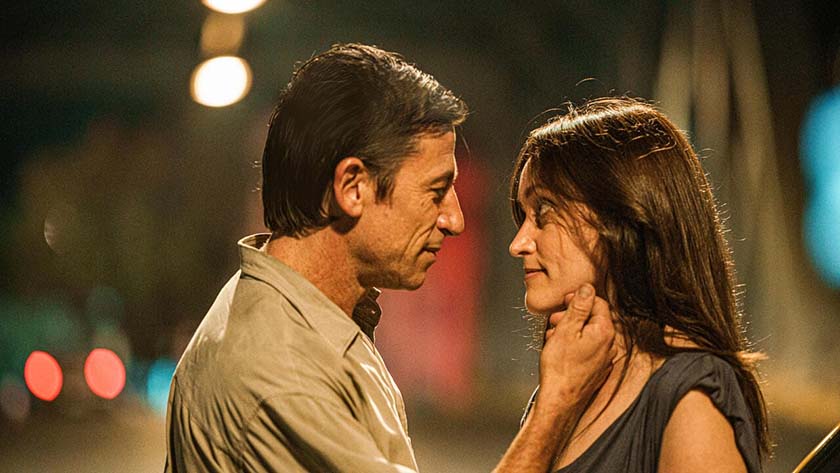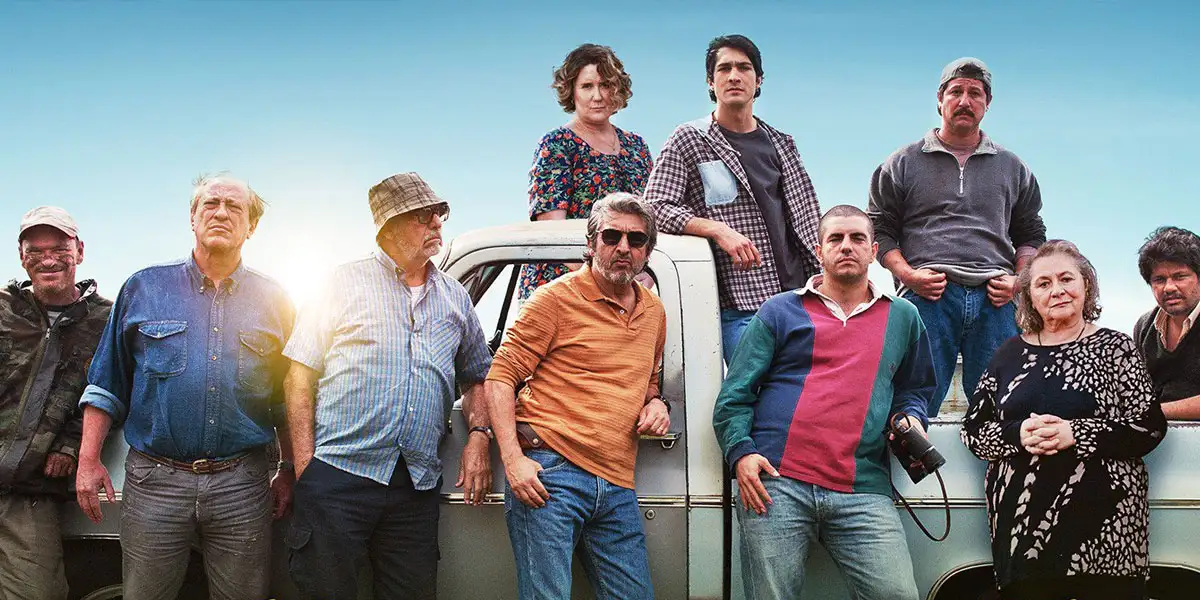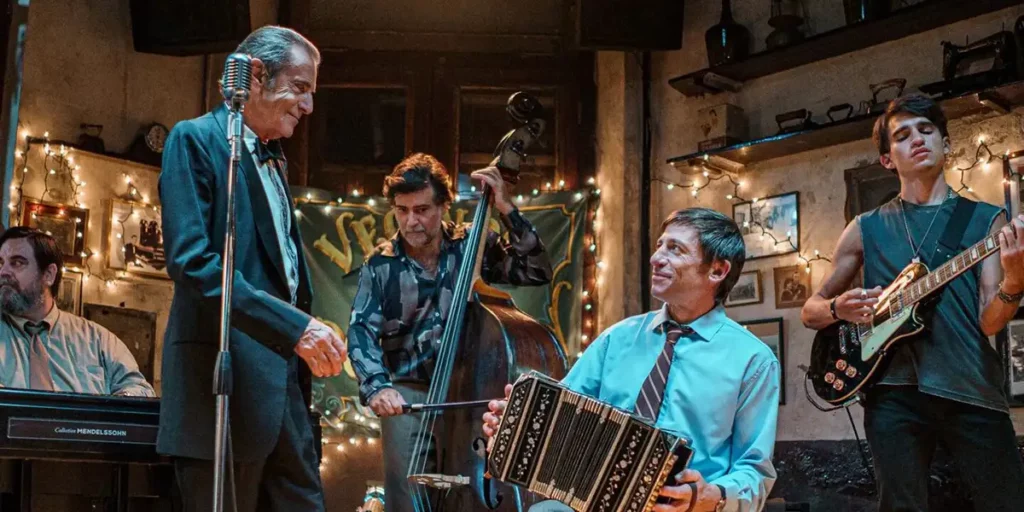German Kral’s tango-filled film Adiós Buenos Aires is a tale of music, love, yearning, and societal collapse in Argentina.
Director: German Kral
Genre: Drama, Music
Run Time: 90′
US Release: May 3, 2024 in NY, May 10, 2024 in LA
UK Release: TBA
Where to watch: in theaters
Adiós Buenos Aires, the latest from director German Kral, evokes a melancholic tango. It’s an exploration of love, friendship, and music infused with a deeply felt, bittersweet passion. This beautifully shot film is threaded with the philosophy and melancholy of song lyrics that only an artist who has suffered deeply can manage. Its drama is deeply motivated by the civil strife in Argentina, and the lived experiences of our characters dealing with it all.
The story is set in Argentina in late 2001, right when everything is going wrong as the country plunges into an economic crisis. Julio Färber (Diego Cremonesi), a musician in a close-knit tango band, is desperate to ditch his crumbling country for a fresh start in Germany. But a run-in with Mariela Martínez (Marina Bellati), a wayward and uninsured taxi driver who broadsides his car, throws a wrench in the works romantically and financially. Suddenly, everything’s an obstacle to his dream of a more stable life for himself and his daughter Paula (Violeta Narvay) and getting paid something more than three empanadas.
Despite the gravity of the situations on film, it’s hard to wallow in them because of the escape the tango music from the band provides. It complements the score by Gerd Baumann perfectly. As an audience, it gives us necessary respite. We are, like Julio, struggling amidst these things happening to him and his country, yet we find solace in the beautiful soundscape from songs like Nicolás Enrich’s “Oblivion” or Luz en la sombra. The most powerful emotional moments in the film, where tragedy reigns, are heightened by a soundscape whose instrumentation itself is beautiful, but whose lyrics are desperately sad. American audiences (like this author) might be tempted to think that the music we are hearing is from the accordion, but it’s not; it is from a German-designed instrument called a bandoneon that is known as the national instrument of Argentina. When words aren’t enough to convey the pain our characters are feeling, the music does.
Argentinian director German Kral has spent much of his filmography exploring his own complicated German and Argentinian Roots, as well as music. And for those with an eye for German cinema, you will be unsurprised to know that Kral’s career has even taken him to work with famed German director Wim Wenders. Indeed, though Kral’s style is very musical, there are hints of Wenders’ influence in this work. There is a philosophy not totally out of alignment with Perfect Days.

Adiós Buenos Aires captures the paradox of old-world yearning and also a sense of being betrayed by the civil structures of the country that has failed you. Though this movie is set in the past, there is a thematic link there that feels very relevant today. The pandemic tested us all, and lots of the dialogue in this script, especially as spoken by Julio’s bandmates in the Vecinos de Pompeya, is as true about Argentina’s 2021 economic nightmare as it is about our own recent world health crisis. The only way through this all is together, and like for us in modern times, that is what Julio must ultimately discover.
The male friendships in Adiós Buenos Aires are powerful. The gigs with the Vecinos de Pompeya are such a big part of his life, and his friendships with them are too. They are without malice or grandstanding and are simply built around mutual respect and love anchored by music. None of the characters in the band feel underdeveloped. Thanks to the clever script penned by Stephan Puchner, Fernando Castets, and German Kral, we get a sense of the measure of each man and their fears. Tito (Rafael Spregelburd) owns a car shop, Atilio (Manuel Vicente) is a teacher, and Carlos (Carlos Portaluppi) is a gambler who recently lost his job and whose family is at risk. These are vulnerable characters, and the full complex sensitivity of the men playing them is on display in this film. When Julio delivers the news about his decision to emigrate from Argentina to Germany, their pain cuts us to the core. And when tragedy befalls one of the men late in the story, it acts as a catalyst for Julio’s ultimate growth.
We are also drawn to the story of Maestro Ricardo Tortoella (Mario Alarcón). An older vocal master, the Maestro is found by our trio of male friends in an old-age home.The Maestro’s initial introduction is designed to have you believe that time has passed him by, however it soon becomes clear that his voice is as powerful as ever. Although he’s tired, he’s not quite ready to be driven straight to the crematorium. Mario Alarcón easily slips into this role and his character perfectly transitions into the band.
Mariela Martínez describes herself as an “emotional time bomb.” She’s both Julio’s romantic interest and also a source of conflict in the film. While the character has the frantic quality of a mom who just wants to provide for her deaf son, we empathize with her. After crashing her taxi into his car, the two strike up a relationship born out of the absurdity of a shared experience of tough times. Marina Bellati brings a believable flare to this role.
If you know your history, there is a pivotal moment when Julio visits the bank and deposits his American dollars into the Argentina bank that will make you instantly gasp. Lingering close-up shots on the bank receipts portend something devastating to come for our main character. Later on in the story, a plate drop by Julio’s mother spells the oncoming doom that we know is coming for Julio’s best-laid plans. As part of government efforts to control the crisis, the bank is holding Julio’s, as well as everyone else’s, money.
Sometimes, when you move away from what you know, it is for happy reasons. But for Julio, the reasons are not precisely happy. Though he has his friendships and his family, there is the sense that the society in which he plays a part is rapidly declining, and he has no choice but to go. Julio’s grief is most apparent after he sells his shoe shop. He realizes he isn’t only getting rid of the shop, but a big part of his family legacy. His father was the shop’s original owner, and the small store is crammed with sentimental objects. The new owners aren’t saddled by this history, and unceremoniously throw things out. Actor Diego Cremonesi captures this grief with a tenderness that makes you as the audience feel his ache at what he is giving up.
Adiós Buenos Aires is a film that speaks not only to the specific historical context of Argentina’s collapse but also invites us to sit with the ache of yearning, the weight of societal failings, and the contradictory beauty that persists even amidst struggle. The music, a constant companion, underscores both the joy and the melancholy of life. Perhaps most poignantly, the film suggests that the deepest bonds – those of family, friendship, and a shared passion – are what ultimately sustain us when the world seems determined to break our hearts. Julio’s growth is our own, too, and maybe like him, we must learn to appreciate the simple joy of what we have.
Adiós Buenos Aires will open in New York on May 3, 2024 and in Los Angeles (Laemmle Royal) on May 10.

 loudandclearreviews.com
loudandclearreviews.com
